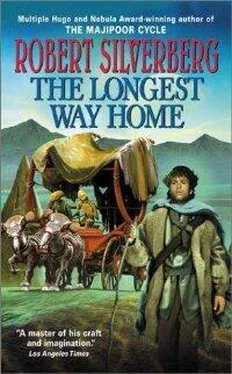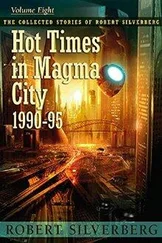“And for me also. I won’t ever forget it.” She giggled. “Grovin would kill me if he found out. He thinks he owns me, you know. But no one owns me. No one. I do as I please.” She drew a little playful line along Joseph’s jaw with the tip of one finger. “Now we each have a secret against each other, do you see? I could tell Stappin that you’re a Master, but I won’t. And you could tell Grovin that I’ve been to bed with you.”
“But I won’t.”
“No. Neither of us will say anything to anybody. We’ve put each other in each other’s hands. —But now tell me your real name. You can’t be a Waerna. Waerna isn’t a Master name.”
“Joseph,” he said.
“That’s a strange name. Joseph . Joseph . I’ve never heard a name like that before.”
“It’s an ancient name. It goes back to Old Earth. My father has an Earth name too: Martin.”
“Joseph. Martin.”
“I’m not from Ludbrek House, either. Not from Manza at all. I’m Joseph Master Keilloran of House Keilloran in Helikis.”
It was strange and somehow wonderful to speak the full name out loud, here in this little Folkish town, in this Folkish house, lying here naked in the arms of this naked Folkish girl. It was the final nakedness, this last stripping away of all concealment. Thayle had never heard of House Keilloran, of course, had barely heard of Helikis itself—a far-off land, that was all she knew, somewhere down in the southern part of the world—but she said the name three or four times, Joseph Master Keilloran of House Keilloran in Helikis, Joseph Master Keilloran of House Keilloran in Helikis, as though the words had some magical potency for her. She had some difficulty pronouncing Joseph’s surname correctly, but he saw no point in correcting her. Joseph felt very drowsy, very happy. Idly he stroked her body in a tender but nonsexual way, his hand traveling lightly along her flanks, her belly, her cheeks, a purely esthetic enjoyment, simply enjoying the smoothness of her, the firmness of her skin and the taut flesh and muscle beneath it, the way he might stroke a finely carved statuette, or a thoroughbred racing-bandar, or a perfectly thrown porcelain bowl. He did not think there was any likelihood that he could feel desire again just yet, not so soon after those two cataclysmic couplings. But then his hands were going to her breasts, and then to her thighs, and to his surprise and delight he felt himself awakening to the pull of her body one more time, and she made a little chuckling sound of approval and drew him down into her once more.
Afterward she kissed him gently and wished him pleasant dreams, and gathered up her scattered clothing and went out. When she was gone Joseph lay awake for a while, reliving all that had taken place, playing it back in his mind with the utmost vividness, watching it all in wonder, amazement, even disbelief. He tumbled then into sleep as into a crevasse on some lofty snowy mountain slope and was lost in it, dreamless, insensate, until morning.
There was no possibility after the experiences of that night of his leaving Eysar Haven of his own volition, regardless of the risks involved in his staying. Thayle had tied him to it with unbreakable silken bands. His only thought now was of when she would enter his bed again.
But that did not happen immediately. Often in the days that followed Joseph would glance toward her and see that she was covertly looking at him, or that she was smiling warmly in his direction, or even winking and blowing him a kiss; but though he lay awake for a long while each night hoping for the sound of the opening door, the footsteps approaching his bed, the rustle of clothing being shed, four nights went by before she finally did come back. It was an eternity. “I thought you were never going to be with me again,” he said, as his hands moved toward her breasts. She said something about needing to take care that her parents did not discover what was going on under their own roof. No doubt that was so. But also it had occurred to Joseph that Thayle probably was in the habit of spending several evenings a week with Grovin, and would not want to come to him while her body was still sweaty and slippery from another man’s passions. He tried not to think about that; but it was a time of agony to him, those nights that he waited in vain for her, imagining that at this very moment she might be with Grovin, doing with him the same things that he so desperately wanted her to be doing once more with him.
Twice during those days his path and Grovin’s crossed in town, and both times Grovin gave him hard, sour looks. Joseph asked Thayle about that, wondering whether Grovin suspected something, perhaps the truth about Joseph’s identity or else the possibility that he and Thayle were taking advantage of his presence in her family’s house to do the very thing that they were in fact doing. But she assured him that neither could be true. “If he so much as dreamed you were a Master, he’d have taken it up with Stappin already. And as for suspecting you and me—no, no, he’s so confident of himself that it would never occur to him. If he thought anything was going on between us he’d have let me know about it by now.”
“Then why does he look at me that way?”
“He looks at everybody that way. It’s just the way he is.”
Maybe so. Still, Joseph did not much like it.
The summer days floated along in a golden haze of mounting heat. The harvest season approached. Joseph lived for the nights of Thayle’s visits. Helikis might have been a continent on another planet for all that it entered his mind.
They were friends as well as lovers, by this time. In the intervals between their bouts of lovemaking they talked, lying side by side looking toward the ceiling instead of at each other, sometimes for hours. She revealed a lively, questing intelligence: that came as a surprise to Joseph. It fascinated Thayle that he should be a Master. In this district of cuyling Folk, where the nearest Great Houses were far off beyond the mountains, Masters were unfamiliar, exotic things. She understood that most of the rest of the world was divided up into huge feudal estates on which her people had for many hundreds of years lived, essentially, as property, until the recent outbreak of violent revolution. She had heard about that, anyway. But she seemed to have no inward grasp of what it was like. “You own the Folk who live on your land?” she asked. “How is that, that one person can own others?”
“We don’t exactly own them. We provide for them; we make sure everyone is housed, that nobody goes hungry, that there’s work for everybody, that good medical care is available. And in return for that they work the lands, and look after the livestock, and do what needs to be done in the factories.”
“But everyone is housed here in Eysar Haven, and everyone has work to do, and nobody goes hungry, and all of that. Why would we need Masters here?”
“You don’t, I suppose. But the Folk of other places aren’t as self-sufficient as the people of the cuyling towns are.”
“You mean, they came to your ancestors and said, ‘Please rule us, please be our Masters?’ They wanted your people to take charge of their lives for them?”
“Well, in a manner of speaking—”
“No. Actually they were conquered, weren’t they? There was a thing called the Conquest, when the Masters came out of the sky and seized the land and forced everyone to submit to them. Except for a few like us, off in places of the world that nobody seemed to want to bother conquering. Isn’t that so, Joseph?”
He could not deny that. He would not even try. It would not be known as the Conquest, he thought, if it had not been a conquest. And yet—yet—it had always been his understanding that the Masters had imposed the system of Great Houses upon the Folk for the good of the Folk themselves, not just for their own, and that the Folk had learned to see the wisdom of that system. It had been his understanding, too, that the Folk were an inherently weak breed, nothing more than creatures of a docile domesticated sort that had been waiting for leadership to be provided for them.
Читать дальше












